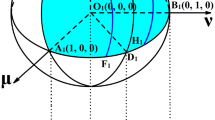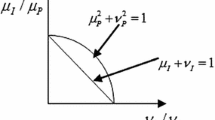Abstract
Loss functions, commonly believed to be the cost of cognitive computing, are a key element in decision-making, and three-way decisions can be regarded as a cognitive computing method that seeks to minimize the overall risks involved in the decision-making process. Recently, many studies on loss functions have been conducted based on fuzzy sets, intuitionistic fuzzy sets, and interval intuitionistic fuzzy sets. However, most of these studies draw conclusions based on two descriptions, which may fail to capture the whole picture of decision-making. In this paper, in order to improve the accuracy of decision-making, we propose loss functions based on three descriptions, adding a hesitation description to the Pythagorean fuzzy environment. Then, we redefine the expected loss functions, which allow people to make a decision with more uncertainty. Subsequently, on the basis of the Bayesian minimum risk decision theory, four strategies for dealing with expected losses are proposed, and three-way decision models are established. Finally, group decision models are discussed. Three-way decision models of real value loss functions and Pythagorean fuzzy loss functions based on three descriptions are proposed, and data analyses of different parameters show the feasibility of the three-way decision models.








Similar content being viewed by others
References
Yager RR. Pythagorean membership grades in multi-criteria decision making. IEEE Trans Fuzzy Syst. 2014;22(4):958–65.
Peng XD, Yang Y. Some results for Pythagorean fuzzy sets. Int J Intell Syst. 2015;30:1133–60.
Peng XD. New similarity measure and distance measure for Pythagorean fuzzy set. Compl Intell Syst. 2019;5:101–11.
Zeng SZ, Chen JP, Li XS. A hybrid method for Pythagorean fuzzy multiple-criteria decision making. Int J Info Tech Decis Making. 2015;14:1–20.
Zhang XL. Multi-criteria Pythagorean fuzzy decision analysis: a hierarchical qualiflex approach with the closeness index-based ranking methods. Info Sci. 2016;330:104–24.
Zeng SZ, Mu ZM, Tomas B. A novel aggregation method for Pythagorean fuzzy multiple attribute group decision making. Int J Intell Syst. 2018;33:573–85.
Yu LP, Zeng SZ, José MM, Zhang CH. A new distance measure based on the weighted induced method and its application to Pythagorean fuzzy multiple attribute group decision making. Int J Intell Syst. 2019;34:1440-1454.
Nguyen XT, Nguyen VD, Nguyen VH, Garg H. Exponential similarity measures for Pythagorean fuzzy sets and their applications to pattern recognition and decision-making process. Compl Intell Syst. 2019;5:217–28.
Pawlak Z. Rough sets. Int J Comp Info Sci. 1982;11:341-356.
Yao YY. Probabilistic rough set approximations. Int J Approx Reas. 2008;49:255–71.
Yao YY. Three-way decisions with probabilistic rough sets. Info Sci. 2010;180:341–53.
Yao YY. An outline of a theory of three-way decisions. Springer, Heidelberg. 2012;7413:1–17.
Yao YY. Three-way decisions and cognitive computing. Cogn Comp. 2016;8:543–54.
Yang XP, Tan AH. Three-way decisions based on intuitionistic fuzzy sets. Lecture Notes in Comp Sci. 2017;10314:290–9.
Liu JB, Zhou XZ, Huang B, Li HX. A three-way decision model based on intuitionistic fuzzy decision systems. IJCRS: International Joint Conference on Rough Sets. 2017;10314:249-263.
Liang DC, Liu D. Deriving three-way decisions from intuitionistic fuzzy decision-theoretic rough sets. Info Sci. 2015;300:28–48.
Liang DC, Xu ZS, Liu D, Wu Y. Method for three-way decisions using ideal TOPSIS solutions at Pythagorean fuzzy information. Info Sci. 2018;435:282–95.
Lang GM, Miao DQ, Hamido F. Three-way group conflict analysis based on Pythagorean fuzzy set theory. IEEE Trans Fuzzy Syst. 2020;28(3):447–61.
Mandal P, Ranadive AS. Decision-theoretic rough sets under Pythagorean fuzzy information. Int J Intell Syst. 2018;33:818–35.
Xue ZA, Zhu TL, Xue TY, Liu J, Wang N. Model of three-way decision theory based on intuitionistic fuzzy sets. Comp Sci. 2016;43(6):283–97.
Chen SN. Research on Pythagorean fuzzy multi-attribute decision making method (Master Thesis). Zhenjiang: Jiangsu University of Science and Technology; 2019.
Yao YY, Wong SKM, Lingras P. A decision-theoretic rough set model. In: Ras ZW, Zemankova M, Emrich ML, editors. Methodologies for Intelligent Systems. New York: North-Holland; 1990. p. 17–25.
Qu GH, Zhang HP, Liu ZL. Group decision making based on \(\lambda\)-Shapley Choquet integral novel intuitionistic fuzzy TOPSIS method. System Engineering Theory and Practice. 2016;36(3):726–42.
Funding
This study was funded by the National Natural Science Foundation of China (No. 62076088), by the Natural Science Foundation of Hebei Province (Nos. A2018210120, A2020208004), by the Training Funds for Talents Project in Hebei Province (Nos. A2017002112, A201901049).
Author information
Authors and Affiliations
Corresponding author
Ethics declarations
Conflicts of Interest
All authors declare that they have no conflict of interest.
Ethical Approval
This article does not contain any studies with human participants or animals performed by any of the authors.
Rights and permissions
About this article
Cite this article
Zhang, SP., Sun, P., Mi, JS. et al. Three-way Decision Models of Cognitive Computing in Pythagorean Fuzzy Environments. Cogn Comput 14, 2153–2168 (2022). https://doi.org/10.1007/s12559-021-09867-0
Received:
Accepted:
Published:
Issue Date:
DOI: https://doi.org/10.1007/s12559-021-09867-0




